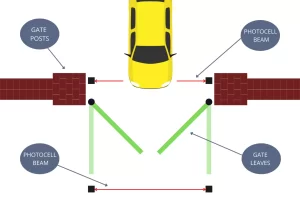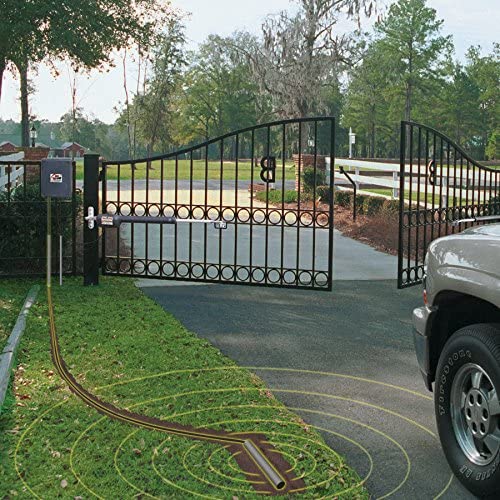[ad_1]
Automatic driveway gates offer several benefits, including added security, privacy, and convenience. However, they require automatic driveway gate sensors that can detect vehicles and pedestrians to ensure that they open and close automatically. These sensors vary in technology, sensitivity, and price, making it essential to choose the right type for your needs. In this article, we’ll discuss the various types of automatic driveway gate sensors and provide guidelines for selecting the best one.
Types of Automatic Driveway Gate Sensors:
1. Photoelectric Sensors:
Photoelectric sensors, also known as photo eyes, are the most common type of automatic driveway gate sensor. They use infrared beams to detect objects moving in their path. These sensors consist of two units, one on each side of the gate. The first unit emits an infrared beam to the second unit. When the beam is interrupted by a vehicle or pedestrian, the sensors send a signal to open or close the gate. Photoelectric sensors are easy to install, and they work well in most weather conditions. They are also affordable and reliable.
2. Magnetic Sensors:
Magnetic sensors are another type of automatic driveway gate sensor that detects metal objects, such as vehicles. These sensors use magnets to create a magnetic field that senses the presence of a car or truck. The sensor is mounted on the pavement or ground, and it sends a signal to open or close the gate when a vehicle passes over it. Magnetic sensors are reliable and accurate, and they work well in all weather conditions. However, they are more expensive than photoelectric sensors.
3. Pressure Sensors:
Pressure sensors are usually installed under the pavement or ground and sense the weight of a vehicle or pedestrian passing over them. When the weight threshold is met, the sensors send a signal to open or close the gate. Pressure sensors work well in all weather conditions and are ideal for heavy-duty applications. However, they require professional installation, and they are the most expensive type of automatic driveway gate sensor.
4. Microwave Sensors:
Microwave sensors emit low-power, microwave signals to detect movement nearby. When a vehicle or pedestrian moves within the sensor’s range, the signal is interrupted, and the sensors send a signal to open or close the gate. Microwave sensors work well in all weather conditions, and they can detect large vehicles, such as trucks or buses, over a long distance. However, they are more expensive than photoelectric sensors, and they can be affected by interference from nearby objects, such as trees or buildings.
Which Automatic Driveway Gate Sensor is Right for You?
When selecting the right automatic driveway gate sensor for your needs, you need to consider several factors, such as your budget, the type of gate you have, the level of security you require, and the weather conditions in your area. Here are some guidelines to help you choose the best sensor:
1. Budget:
If you are on a tight budget, photoelectric sensors are the best option. They are affordable and reliable, and they work well in most weather conditions. Magnetic sensors are also a good option, but they are more expensive than photoelectric sensors.
2. Type of Gate:
The type of gate you have will determine which sensor is most appropriate. Photoelectric sensors are ideal for swinging gates, while magnetic sensors are best for sliding gates. Pressure sensors are suitable for heavy-duty applications, such as commercial or industrial gates.
3. Security Level:
If you require a high level of security, pressure sensors and microwave sensors are the best options. Pressure sensors are difficult to bypass, and they can detect the weight of vehicles and pedestrians. Microwave sensors can detect movement over a long distance, making them ideal for large properties.
4. Weather Conditions:
If you live in an area with extreme weather conditions, such as heavy snow or rain, magnetic sensors and pressure sensors are the best options. Photoelectric sensors and microwave sensors may be affected by adverse weather conditions.

FAQs:
1. How do automatic driveway gate sensors work?
Automatic driveway gate sensors use various technologies to detect the movement of vehicles and pedestrians. Photoelectric sensors use infrared beams, magnetic sensors use magnets and a magnetic field, pressure sensors use weight, and microwave sensors use low-power microwave signals.
2. How do I choose the right automatic driveway gate sensor for my needs?
You should consider factors such as your budget, the type of gate you have, the level of security you require, and the weather conditions in your area when choosing an automatic driveway gate sensor.
3. Can I install automatic driveway gate sensors myself?
Photoelectric sensors are easy to install and can be done by homeowners, while magnetic sensors and pressure sensors require professional installation.
4. Are automatic driveway gate sensors reliable?
Automatic driveway gate sensors are reliable and accurate, but they require regular maintenance to ensure optimal performance.
Conclusion:
Automatic driveway gate sensors are an essential component of any automated gate system. The type of sensor you choose will depend on various factors, such as your budget, the type of gate you have, the level of security you require, and the weather conditions in your area. By following the guidelines outlined in this article, you can select the best automatic driveway gate sensor for your needs and enjoy the convenience, security, and privacy of an automated gate system.
[ad_2]


